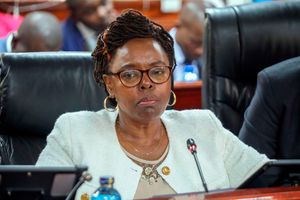
The National Assembly Education Committee chaired by Tinderet MP Julius Melly at Bunge Tower in Nairobi on May 13, 2025.
A behind-the-scenes standoff between the Ministry of Education and the National Treasury has come to light following revelations that a Treasury official made sweeping budget cuts to the education sector under pressure to meet Cabinet deadlines.
The Ministry of Education now argues that the cuts will affect crucial programmes in the education sector. As a result, the Kenya Union of Post-Primary Education Teachers (Kuppet) has called for the reinstatement of previously allocated funds, warning that the quality of education would be affected.
Appearing before the National Assembly Committee on Education, Julius Bitok, the Principal Secretary for Basic Education, said that the Ministry of Education had not been consulted on the drastic revisions contained in the 2025–26 budget estimates.
The estimates presented to the National Assembly indicate a shortfall of Sh62 billion for the sector, with significant reductions to several budget lines that had been recommended for funding in the Budget Policy Statement.
The estimates show zero funding for school examinations and invigilation, despite a requirement for Sh12.5 billion. There has also been a Sh1.8 billion cut to capitation for free primary education, as well as a Sh21.85 billion cut to senior school capitation.
Furthermore, funding for junior school capitation has been reduced by Sh18.8 billion, funding for the school feeding programme has been cut by Sh4.2 billion, and quality assurance, essentially the inspection of schools, has received no budgetary allocation.
“There is a significant reduction in the funding in the budget which was not done in consultation with us. That is why we are asking the committee to step in and help reinstate the affected areas,” Prof Bitok told the legislators.
During the committee’s session, it emerged that Nehemiah Odera, a budget officer at the National Treasury, had implemented the changes single-handedly, citing Cabinet instructions to rationalise spending.
He admitted that the education budget had been revised hastily to meet internal deadlines, without input from the Ministry of Education.
Mr Odera struggled to explain how learners were going to take exams and who was going to supervise them.
The budget requirement to administer the 2025 Kenya Primary School Education Assessment (KPSEA), Kenya Junior School Education Assessment (KJSEA) and Kenya Certificate of Secondary Education (KCSE) is Sh12.58 billion.
The fallout has triggered widespread concern, with Kuppet warning that these deep cuts threaten the quality of education and undermine key reforms, including the Competency-Based Curriculum (CBC).
“Kuppet demands the reinstatement of education funding as contained in the Budget Policy Statement—which itself was grossly inadequate for the sector’s needs,” Secretary-General Akelo Misori told journalists on Wednesday.
He described the reductions as “the most ambitious rollback of social spending since independence”.
On Tuesday, Education Committee Chairman Julius Melly warned that Parliament would not proceed with the budget report unless funds for examinations were reinstated.
“We shall not write our report without the examination money,” he said, directing PS Bitok to submit an addendum, in consultation with the Treasury, reinstating key allocations.
These include funds for examinations, school capitation, quality assurance, and the school feeding programme.
Despite a public pledge by President William Ruto during the Labour Day celebrations, the Teachers Service Commission (TSC) has not been allocated any funding to hire 20,000 new teachers in January 2026.
The Commission has been allocated Sh387.7 billion, but crucial components such as the teachers' medical scheme, disciplinary processes and the 2025-29 Collective Bargaining Agreement (CBA) are either unfunded or underfunded.
The current CBA expires in June, and Kuppet has already proposed upward revisions to hardship allowances as part of the new negotiations.
The union has also criticised the Ministry of Education for its inconsistent policies regarding junior secondary schools, particularly a recent circular seeking to place junior school teachers under primary school management.
“We demand the circular’s immediate withdrawal and proper recognition of co-curricular activities in junior schools,” said Mr Misori, emphasising that junior schools are autonomous and should be delinked from primary institutions.
Before these latest cuts, the education sector had already been hit by the removal of funding for the student medical insurance programme Edu-Afya, university research, and higher education loan schemes.






